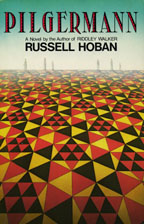 Pilgermann here. I call myself Pilgermann, it's a convenience. What my name was when I was walking around in the shape of a man I don't know, I simply can't remember. What I am now is waves and particles, I don't need to walk around, I just go.
Pilgermann here. I call myself Pilgermann, it's a convenience. What my name was when I was walking around in the shape of a man I don't know, I simply can't remember. What I am now is waves and particles, I don't need to walk around, I just go.Pilgermann is the story of a wandering Jew on a pilgrimage to Jerusalem in the late 11th Century. His name isn't Pilgermann, but that's the name that his ghost--or consciousness, or whatever it is that's narrating this novel from beyond the grave--adopts for himself, because his real one is lost to time. What he narrates is the story of his life, beginning with his castration by a Christian mob in his hometown, following with a vision he has of Christ, who tells him to go to Jerusalem. He never actually makes it there, but instead is captured by pirates and ends up in Antioch where he befriends a local Muslim and is eventually killed in a Frankish crusade.
The first half of the book takes its cues from Bosch and Vermeer paintings: European landscapes ravaged by death, haunted by strange and ghastly figures. He is followed by those whose deaths are connected to him: The headless tax-collector who both sicced the mob of Christians on him and saved his life by stopping them short and the highwayman who murdered him (and whom Pilgermann kills), a man named Konrad and his lover Bodwild, who is a sow, and, oh, why not, a bear. There's also the personification of death as Bruder Pfortner, for whom killing is a sexual experience, and the vision of Pilgermann's own death as a child which grows into a man by the novel's end.
The second half is much better; it follows Pilgermann and his new friend, Bembel Redzuk, as they conceive of a massive tiled court they call "Hidden Lion" (see cover), which they erect to study the point at which "stillness becomes movement" and "movement becomes consciousness." If you can't tell, Pilgermann is a book mostly of ideas and not plot; for every page of action there are probably ten pages of Pilgermann's complex thoughts on the nature of religion and death. Some are quite beautiful and profound--for example, I like the way that Pilgermann never gets to Jerusalem, but finds solace in the words of a traveling group of child pilgrims who say, in the face of their own death, "Jerusalem is wherever we will be when we get to the end"--but much is dense, obtuse, and not quite worth the effort it takes to decipher. It is a book full of references from all three of the Abrahamic religions, and one of its chief themes is their interaction. That the Muslim world comes off much better than the Christian (and even the Jewish) is no surprise; Hoban's depiction of the Frankish crusaders as being socially underdeveloped in relation to their Turkish counterpoints is historically accurate.
I picked up this book because Hoban penned one of my favorite novels, Riddley Walker, a post-apocalyptic novel written completely in the strange pidgin English of the future. I'm sad to say that Pilgermann isn't nearly as enjoyable, though serious religious scholars may find it interesting. As disappointed as I am, I still may read another of his books, Turtle Diary, about a pair of strangers who come together to free a couple of sea turtles from the zoo. This guy seriously never writes the same book twice.

2 comments:
Impressed?
I'm not sure if impressed is exactly the right word...but it will do.
Post a Comment